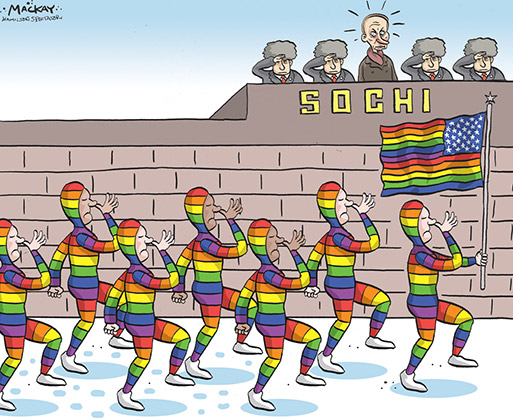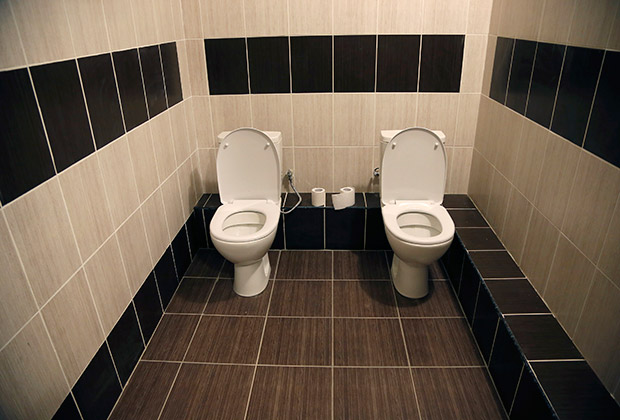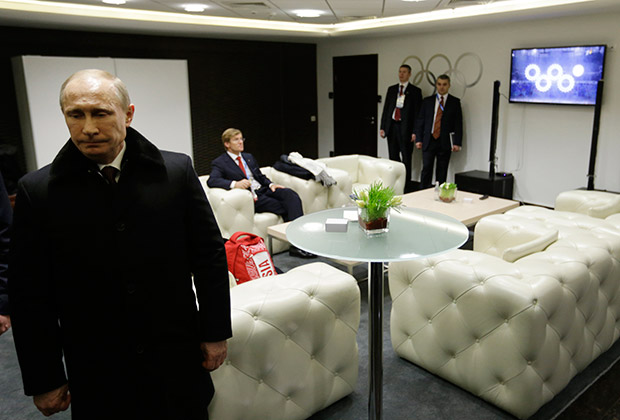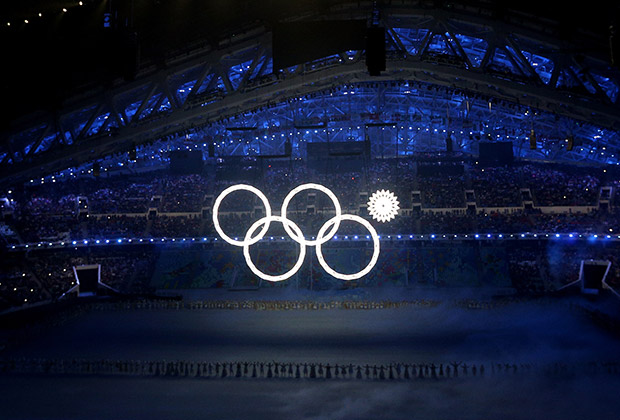This is the second part of an article published by Lenta.Ru on how foreign journalists perceived the Olympics opening ceremonies (read the first part here). The criticism of the Lenta piece is that some readers believe that many of the quotes from the Western authors have been cherry picked, segments critical of Putin and the Olympics have been omitted, and some of the language has been watered down in the translation. The accusation is that Lenta is softening their criticism of Russia’s Games or painting all criticism as “Russophobia.” We have provided links back to all original pieces so that readers may judge for themselves — Ed.
Main Question of Our Times
The description of the opening of the 2014 Games by Western journalists could not get by without mentioning complicated relations of the Russian government with the LGBT community. Moreover, Google welcomed the day of the Olympics ceremony with a doodle showing the gay pride rainbow with drawings of winter sports.
Why is the Western public much less concerned about the fact that in 2022, the World Soccer Championship will be hosted by Qatar, where homosexual relations between men is punished by five years of imprisonment? Lenta.ru has already tried to explain [in a past article.] Briefly, it’s because Russia is perceived as a country of European culture, unlike, say, Iran, Saudi Arabia or Uganda.
Thus, in the opening ceremony, Russia demonstrated this “European-ness” with complete awareness and cold calculation. For example, for the “warm-up,” it displayed the girls’ duet t.A.T.u., famous for their demonstrative and fake lesbianism. Russia should be awarded a “medal for hypocrisy,” concludes Philippe Gélie of the French newspaper Le Figaro.
“In a somewhat surreal turn of events, much of the hour [for the warm-up of the public—Lenta.ru] had been given a – perhaps unintended – gay theme. The competitors’ seats were painted in rainbow colours, the first song was a rendition of Queen’s ‘We Are the Champions’ [as is well known, Freddie Mercury, front man of the group, was gay—Lenta.ru], followed by the faux-lesbian pop duo tATu, who sang one of their hits from a decade ago, ‘Not Gonna Get Us,’” writes Shaun Walker of The Guardian.
The German Die Tageszeitung added Pyotr Tchaikovsky to this list — “Is the only good gay a dead gay?”
The American news portal The Daily Beast went further than the prim British press and devoted an entire feature to proving that the ceremony was “absolutely gay” – and as proof of this were both the “dancing jelly fish” and the section about Stalin’s industrialization, which the site called “an impressive extension of the Pet Shop Boys ‘Go West.’”
The Paradox of the Double Toilet
Many publications , commenting on the opening of the Games, mentioned various absurdities in the comfort facilities for athletes and guests in the Olympics, and also the journalists covering it. The flood of reports on double toilets, the lack of hot water, the wi-fi constantly dropping out, and the light bulbs falling from the ceiling on the heads of guests was so significant that it led to a wide public discussion in which both Russian professional patriots and many foreign publications took part.
Jonathan Liew of the British Telegraph followed the ceremony from London and was unpleasantly surprised that the BBC narrators turned on the “jaunty folk music” at any occasion (one supposes it was a balalaika) and discussed various problematic stories from Sochi. “You wonder whether the BBC might have adopted a similar approach to London 2012: introducing their coverage by moaning about public schools and welfare dependency, before cutting to an educational feature on the [1972] Bloody Sunday massacre,” writes Liew.
Sally Jenkins of The Washington Post wrote some heartfelt material from Sochi: “To people who live in this Russia, foreign sportswriters who complain about missing door handles and cold water showers must sound impossibly naive and spoiled. What did we expect in a country of such harsh climate and history?”
Julia Ioffe of The New Republic also published an article on the eve of the opening, in which she complained about the schadenfreude of foreign correspondents which bordered on chauvinism and Russophobia. To be sure, her column met with a harsh rebuttal on the pages of the conservative American publication The Federalist. David Harsanyi, author of an article titled “In Praise of Sochi Schadenfreude,” followed a simple logic: Russia is “an authoritarian state” and to attack an authoritarian state is not only not shameful, it is the only right thing to do: “On the bright side, Sochi has been utter embarrassment for Vladimir Putin … Yes, this includes opening ceremonies, with its Cirque du Soleil celebration of 20th -century tyranny.”
There was only one real embarrassment during the ceremony (and it could not remain unnoticed) – the snowflake that didn’t open, which should have turned into the fifth Olympic ring. “One could almost hear Mr. Putin’s palm slapping his forehead,” The Christian Science Monitor reacted.
“[I]f the games proceed as badly as many journalists in attendance seem to expect (or secretly want them to) – [the failed ring] will probably serve as an enduring metaphor,” noted Elias Groll at Foreign Policy.
However Ian Chadband of the British Telegraph, for example, did not find the slightest sign that Putin or anyone in his entourage was embarrassed by this misunderstanding: “Still, for the rest of this impressive night […] the tiger-hunting president looked like the cat with the cream, the big winner […] as he watched the gravity-defying, dreamy tableaux floating high in the arena along with 40,000 in the biggest of those space-age venues that have miraculously sprouted from swampland on the banks of the Black Sea here in Joe Stalin’s favourite resort.”
The French Le Monde in an editorial also emphasized that the Sochi project had become for Putin a matter of his life’s work, to be more precise, “the crown of his rule, the triumph of his presidency, whose ambitions include demonstrating the return of Russia to the ranks of the grandes.” The Italian La Stampa simply called the Games “Putin’s Olympics,” and called Putin himself a “tsar” experiencing his “personal triumph.”
Where are You Rushing?
If you conceive of the Sochi performance as a “history about itself” told by a government for its citizens, then in the end the tale leaves more questions than answers. It did not escape the attention of commentators, for example that the last 30 years of Russian history did not seem to exist in the official narrative – the legend depicted in Sochi ended with dancers from the stilyagi [of the 1950s], the hipsters of their day, the flights to space and the celebration of childbirth.
“The turbulent recent history, perestroika, the dissolution of the Soviet Union, Russia’s lurches toward and away from democracy, were summed up by a girl letting go of a red balloon,” says Time’s James Poniewozik, bewildered.
“Surely it should have ended with a spotlit shirtless leader on a horse, or wrestling a bear,” snarks the Daily Beast.
“After the program devoted to the Soviet era – there was silence. There was no transition to another period of history. Is such a progression in the ceremony a hint of the fact that the Soviet era has not ended in some places?” asks the Lithuanian portal Delfi.lt.
Analyst Mark Galeotti has the answer: “Finally, in its breathtaking scale and scope, the opening ceremony underscored the extent to which the emphasis on ‘bread and circuses’ to keep the Russian masses happy seems increasingly to mean ‘circuses rather than bread’” The unspoken social contract under which the population renounces its political freedom for the period that it will be guaranteed material prosperity is apparently coming to an end, reflects Galeotti.
In Galeotti’s opinion, under these circumstances, the Kremlin wants to preserve the right to “define the public conversation” by “staging dramatic and crowd-pleasing spectacles,” or by increasing its pressure on the media, as occurred with the scandal around TV Rain; all of this was in order to guarantee that “news is good news” – there is no other.
When one of the five gigantic snowflakes did not turn into an Olympic ring, the state television replaced it with footage taken during rehearsals. “Never mind real success, so long as TV says all is well, it will be. How far will this be a metaphor for what we could call ‘late Putinism’”? concludes Galeotti.



